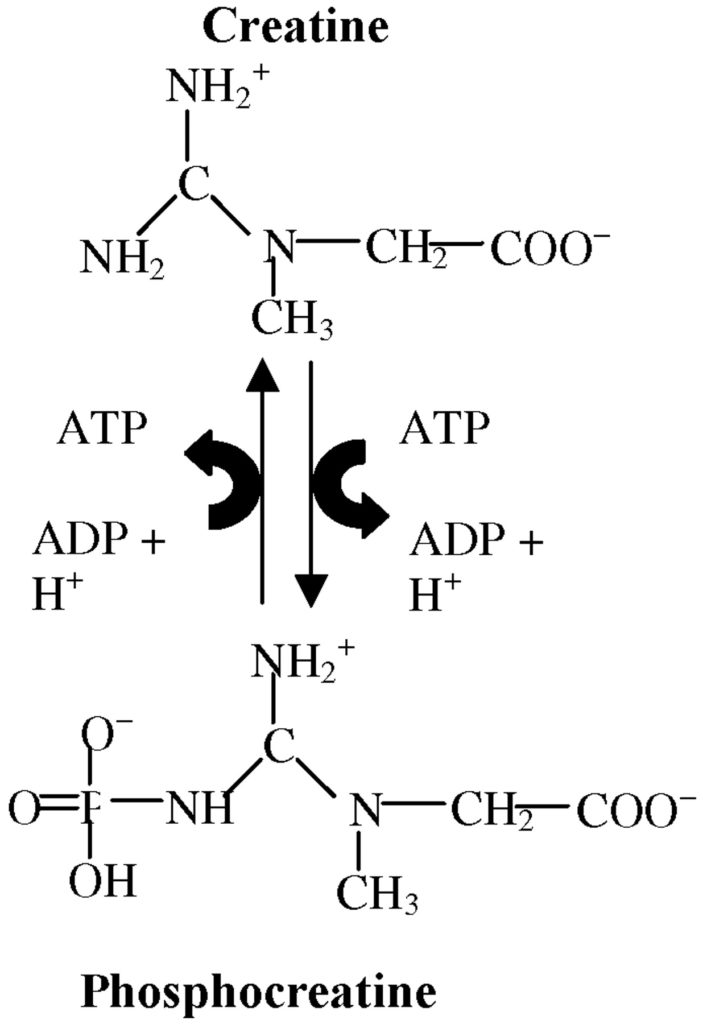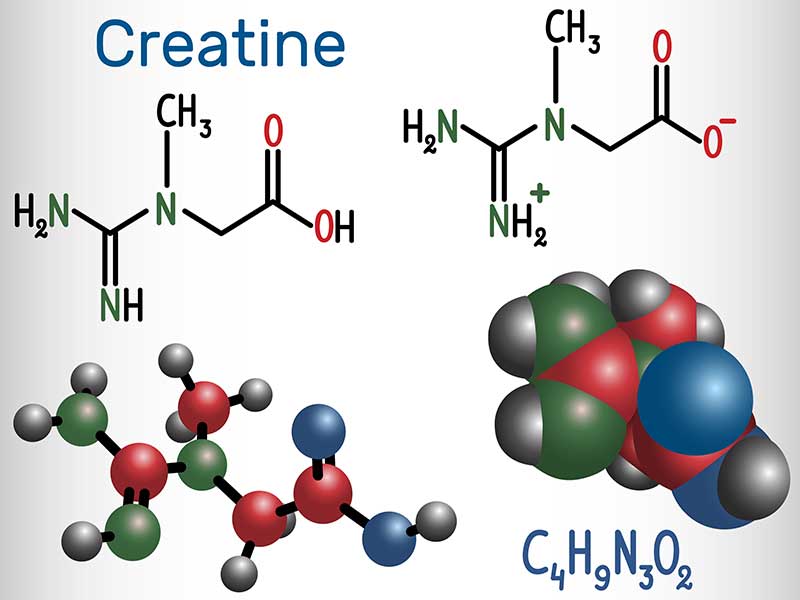Does creatine work for everyone?
It’s estimated that 20-30% of the population is a creatine non-responder. Find out why you might be one and if there’s anything you can do about it.

About 20-30% of the population does not respond to creatine supplementation. Does creatine work for everyone? Not if you happen to be a non-responder. While there are some things you can do , it’s not entirely clear why some people do not respond at all to supplementation.
Just taking creatine doesn’t guarantee it will work for you. If you are one of those “unlucky” 20-30% of the population that takes this sport supplement and notices no effects, you might just be a creatine non-responder. While the exact reason some people do not respond to creatine supplementation is unknown, there are several theories. If you missed the post does creatine work, it’s a good refresher.
Table of Contents
Does Creatine Work for Everyone? Here’s Why It Might Not
Examine the type of exercise you are doing. Creatine effects are most noticed during heavy weight lifting sessions. If you are not engaging in such sessions and maybe doing endurance work, you may not notice the benefits your high intensity weight lifting friends keep telling you about.
Creatine works when muscles are saturated 20% or more. It’s possible you are somebody who has such naturally high levels that saturation with supplementation won’t raise your levels any higher and you won’t notice any additional benefits. Furthermore, some individuals may need more assistance in utilizing creatine from the bloodstream. This is a case for glucose based transports to open the pathways to help get creatine into the muscles. You’ve probably heard somewhere to take creatine with grape juice? This type of sugar transport system is why. To aid in the uptake of creatine into the muscles. If you’ve never noticed the effects, using this type of creatine transport might do the trick.
Does creatine work for everyone? Maybe not if you make poor dietary choices. Diet plays a huge role in your overall nutrition. Excessive caffeine and other variables could prohibit creatine supplementation from working to the full effect.
Exercise enhances creatine absorption. The timing of taking creatine could make a significant improvement to the benefits and overall effects. Try timing your creatine intake to after exercise to increase the uptake and saturation if you are not already doing so.
It appears that with some minor changes to the method used to supplement with creatine, dietary modifications and timing, if you have been a creatine non-responder, you might be able to enjoy the benefits of this supplement.
Energy: The capacity for doing work. (Merriam-Webster Online Dictionary)
Does Creatine Work? And maybe more important, how does it work?
The short answer …
Exercise requires energy. Your body gets energy from the foods that you eat. Those foods are broken down into chemical energy called Adenosine TriPhosphase (ATP). This ATP is stored energy and released as necessary to do work. If you think of the storage of ATP as your energy bank account it can determine your overall ability for instant bursts of power when you exercise.
 One of the most well researched sports supplements is Creatine Monohydrate. Find out how does creatine work and what it does. Learn about the dosage, the safety and the applications of this natural substance and how it’s more than just a bodybuilding supplement.
One of the most well researched sports supplements is Creatine Monohydrate. Find out how does creatine work and what it does. Learn about the dosage, the safety and the applications of this natural substance and how it’s more than just a bodybuilding supplement.
So does creatine work? Let’s continue with ATP as your body’s short-term energy source and see how it plays a major role.
The more ATP you store and have ready, the better the potential for more work to be done. But your muscles can only store so much ATP. Your ability for maximum power is limited to a few seconds. This is where creatine comes into play and answers the does creatine work question. If you think of creatine as a quick payday loan to replenish that bank account, you should understand its the role in quick energy allocation.
Why not just store ATP? It’s a clumsy molecule for the cell to manage. It’s far easier for the body to call upon stored creatine to turn into ATP for short bouts of exercise than to attempt to inefficiently store excessive ATP.
Does Creatine Work?
During the times of heavy exercise when your ATP stores are exhausted, you can call in a quick favor from stored creatine to be turned into ATP for more short-term energy. Creatine can be produced by the body and can be found in certain foods. Making the loan significant and useful, you’ll want muscle saturation to happen. This is where creatine supplementation comes into play. Your body can store high concentrations of creatine and uses it to increase energy availability, as needed.

what is creatine LEWIGS
What is Creatine?
Creatine is a molecule in an energy system (creatine phosphate) that can rapidly produce energy (ATP) to support cellular function, and this underlies the performance-enhancing and neuroprotective properties of creatine. A remarkably safe and well-researched supplement for most people. – Source: Examine.com
What is Creatine Phosphate?
Creatine Phosphate is an organic compound in the muscle that is chemically changed for the production of ATP. Do not make the mistake of equating this form of creatine with the phosphocreatine (PCr) stored within muscle cells.
What is Adenosine TriPhosphate (ATP)?
This molecule is often metaphorically referred to as the energy currency of cells. Removal of the last high-energy phosphate from ATP liberates energy, which is then utilized by the cell to meet energy needs and results in the formation of Adenosine DiPhosphate (ADP). ADP then is recharged by adding back another high-energy phosphate, thereby reforming ATP.
How does creatine work?
Your muscles only save enough ATP to pay for brief bouts of strenuous activity. Having creatine saturation stored within the muscles, allows your body to use the creatine stored for the creation of additional ATP much faster so you can train harder and longer.
How to Take Creatine
Supplements for building muscle, getting lean, and enhancing performance are ubiquitous in the fitness world. There are hundreds of high-potency protein powders, ultra-concentrated creatine, and scores of other products on the market, but almost no one is completely up-to-date with the latest and greatest supplements on the market. Case in point: Creatine personal information. The supplement has been around for over 40 years, but these days, it’s considered one of the best and fastest ways to enhance muscle size.
The good news is that the bad news is that it’s also super expensive. A single 200-milligram vial costs upwards of $45. And for that kind of money, you’d better be ready to make the most out of your dosage, right? The good news is that, if you have the time and knowledge, the supplements you’re using are fully loaded with pure, performance-boosting ingredients like red meat. And the bad news is that, if you don’t have the patience, the time, or the experience, you might not be getting the full effects of the supplement.
Where is Creatine Found Naturally?
In beef, pork, and fatty fish. Even though your body produces small amounts, unless you eat about 1 lb of meat daily, you won’t be able to get the saturation effects of creatine supplementation and benefit from the effects.
Is Creatine safe for long-term use?
Not sure yet. So far there are no ill-reported events and creatine has been on the market since 1990. The long-term effects of prolonged supplementation haven’t been studied yet. If you use the washout phases during supplementation, this won’t matter as you will not be using it continually for years without stopping.
Is Creatine Safe?
Generally speaking, yes. It is a natural amino acid found and produced by the body. There are some side effects of creatine supplementation people have reported but it’s unknown if it’s directly related to the use or other circumstances.
When Is The Best Time to Take Creatine?
Without a doubt, the best time to supplement is immediately after exercise. Following exercise, your muscles are most sensitive to the effects of insulin. This means that the insulin-meditated transport, of carbohydrates, and amino acids into muscle will be greatest after exercise. Take full advantage of this metabolic window of opportunity by taking creatine with simple sugars and whey protein immediately after exercise.
How much should I take?
The amount you take depends on your body weight. During the loading, the phase takes 0.3 grams for each kilogram that you weigh. Reduce the dosage to 0.03 grams per kilogram of body weight during the maintenance phase; 10-times less. Recommended daily dosages are as follows for the maintenance phase:
- Less than or equal to 140lbs = 1.9 grams
- 141lbs to 168lbs = 1.92 – 3 grams
- 169lbs to 199lbs = 2.3- 2.7 grams
- 200lbs to 242lbs = 2.7- 3.3 grams
- 242lb+ = 4-5 grams
It’s much less than the 5g per day you see on almost every product sold. That’s because nobody wants to do the math and 5g a day covers up to a 367 lbs person. You are guaranteed to get results if you respond to creatine by taking that type of dose. It’s not necessary but there’s no evidence to suggest that’s too high or there’s any downside. So the shotgun approach works without the math.
Methods to Take.
The original way to take creatine monohydrate is with warm water; you can add simple carbs as necessary. Cranberry juice is an option if you are susceptible to upset stomachs. Many people like to take it with grape juice as a way to spike insulin, open the pathways and drive in creatine and protein to the hungry muscles.
- Creatine Transport (for non-responders)
20-30% of the population does not respond to creatine. Without knowing the actual reasons, some people have reported getting the benefits if they use some type of transport. The idea is that this will promote an insulin spike which will “shuttle” creatine into your muscles. The basic ingredient in all shuttles is Creatine and Dextrose. - Why use transport?
If you don’t respond to regular supplementation (creatine with water or with protein) give the insulin spike a shot.
Does Creatine work if I don’t do the loading phase?
No, this is not necessary. Just 3 grams per day for 28 days results in the same muscle content of creatine as that of a five-day load. Once you reach muscle saturation, it takes about a month to reach normal creatine levels.
Will I lose weight or muscle mass if I stop using it?
Only if you stop working out. You’ll probably drop some water weight as the extra water that creatine tends to draw into the cells is no longer happening.
Does Creatine make you bloated and retain water?
Creatine should not increase the amount of water found under the skin, subcutaneously. While it is true that creatine causes the body to retain water, water retention is specific for muscle. Bad products with low-quality creatine might cause some bloating.
Is Creatine Good for Everyone?
I think most guys can agree on one thing—if there’s something out there that gets your testosterone to rise, a lot of guys will use it. Whether you believe it’s fat-burning, energy-boosting, or creatine-boosting, it’s amazing to see what it’s done for these guys. However, there are a lot of critics out there who think the same thing—whether it’s the placebo effect or not, we have to wonder what’s the science.
How Does Creatine Build Muscle?
By itself, it does not. Having extra creatine available and stored within muscle, allows your body to quickly create additional ATP when doing intense exercise. By getting another rep or two and working just a bit harder than before, you overload the muscle and encourage growth. If it allows you to do one or two more repetitions beyond what you could do without, that’s how it helps to indirectly build muscle. Taking it without exercise won’t build any muscle but it may offer other health benefits.
If you want to know more details about why creatine works, take a look at the Supplement Reference Guide. It has the answers to this question and hundreds of other sports supplements.
That’s it, in a nutshell. But does creatine work for everyone? Maybe not.
I found the Creatine Supplements for Strength and Fitness to be a very good read. It’s one of the few sites where they do not recommend some mega dose. There’s always the Creatine Wiki which is chock full of info and some valuable links.
Frequently Asked Questions
What Percent of People Does Creatine Not Work on?
The effectiveness of creatine can vary among individuals, and while it is generally well-tolerated and effective for many, there is no definitive percentage of people for whom creatine does not work. The response to creatine supplementation is influenced by several factors, including genetics, diet, exercise habits, and overall health status.
Some individuals may not experience the same magnitude of benefits from creatine supplementation as others. This can be due to variations in factors such as the individual’s baseline creatine levels, muscle fiber composition, or their body’s ability to absorb and utilize creatine. Additionally, individual goals, training protocols, and exercise types can impact the perceived effectiveness of creatine.
It is worth noting that research has shown that a significant proportion of individuals respond positively to creatine supplementation, experiencing improvements in strength, power, and exercise performance. However, it is difficult to provide an exact percentage of non-responders, as the response to creatine is highly individualized.
If an individual does not seem to experience the desired effects from creatine supplementation, it is advisable to assess other factors that may influence their response, such as dosage, timing, and overall training and nutrition regimen. Consulting with a healthcare professional or sports nutritionist can provide personalized guidance and recommendations based on individual circumstances.
Does Creatine Work for Skinny Guys?
Creatine can be beneficial for individuals of various body types, including skinny guys. While creatine is often associated with muscle growth and increased strength, its effects extend beyond bodybuilders or those looking to bulk up.
For skinny guys, creatine supplementation can provide several advantages. Firstly, creatine helps enhance cellular energy production, which can improve exercise performance and allow individuals to train harder and longer. This increased training capacity can lead to more efficient workouts and potentially greater muscle gains over time.
Additionally, creatine promotes intracellular water retention, which can contribute to a fuller and more volumized appearance. This can be particularly beneficial for individuals with a naturally lean or skinny physique, as it can help create a more muscular and defined look.
It is important to note that while creatine can support muscle growth and performance, it should be combined with an appropriate resistance training program and a balanced diet to maximize results. Skinny guys can benefit from incorporating creatine as part of a comprehensive approach that includes regular strength training, adequate caloric intake, and sufficient protein to support muscle growth and recovery.
As with any dietary supplement, it is advisable to consult with a healthcare professional or registered dietitian before starting creatine supplementation to ensure it aligns with individual goals and needs.
Why Some People Don’t Respond to Creatine?
Individual non-response to creatine supplementation can be attributed to various factors, including genetic, physiological, and lifestyle considerations. While creatine is generally effective for many individuals, not everyone experiences the same benefits. Here are some reasons why some people don’t respond to creatine:
- Genetic Variations: Genetic factors play a significant role in an individual’s response to creatine. Some people may have genetic variations that affect the body’s ability to transport and utilize creatine in muscle cells. This can lead to reduced or no response to supplementation. Genetic factors related to creatine transporter genes, like SLC6A8 and SLC22A4, can influence how creatine is absorbed and used by the body.
- Dietary Intake: Creatine is derived from dietary sources like meat and fish. If an individual’s regular diet is already rich in creatine, they may not experience the same benefits from supplementation as someone with a lower dietary intake. This is more common in individuals who consume a diet predominantly composed of animal products.
- Muscle Creatine Content: The baseline creatine content in an individual’s muscles can also impact their response to supplementation. If someone already has elevated muscle creatine levels, the additional intake of creatine may not lead to significant improvements. Regular resistance training can increase muscle creatine stores, making supplementation less noticeable in individuals who are already active.
- Individual Variability: Human physiology is complex and varies from person to person. Some individuals may have a more efficient endogenous creatine production system, while others may have a more effective creatine retention mechanism. These inherent differences can influence how creatine is utilized and whether it results in noticeable effects.
- Dosage and Duration: The response to creatine can also be influenced by the dosage and duration of supplementation. Some individuals may not have taken creatine for a long enough period to observe meaningful changes in their performance or muscle mass. The standard recommendation is to take creatine consistently for several weeks to allow time for the body to saturate muscle creatine stores fully.
- Adherence to Exercise Regimen: Creatine’s benefits are most evident when combined with resistance training or high-intensity exercise. Individuals who do not engage in regular, structured exercise routines may not experience the same improvements in muscle strength and size.
- Hydration and Timing: Proper hydration is crucial when supplementing with creatine, as it can affect creatine uptake in muscles. Additionally, the timing of creatine intake, such as before or after workouts, can impact its effectiveness. Failure to follow recommended hydration and timing protocols can lead to reduced responsiveness.
In summary, non-response to creatine supplementation can be attributed to genetic variations, dietary habits, baseline muscle creatine levels, individual variability, dosage and duration of supplementation, adherence to exercise regimens, and factors related to hydration and timing. It’s essential to recognize that individual responses to creatine can vary widely, and some people may require more time or different strategies to experience its full benefits. Consulting with a healthcare professional or fitness expert can provide personalized guidance for optimizing creatine use based on individual characteristics.
How Do You Know If Creatine Doesn’t Work for You?
Determining whether creatine is effective for you can be based on various factors, including your response to the supplement and specific characteristics of your body. One approach is to assess changes in strength and muscle size after a period of creatine supplementation.
Start by experimenting with creatine monohydrate at a daily dose of 10–20 grams for a couple of weeks. Monitor any improvements in strength and hypertrophy during this time. For many individuals, especially those with proper dosage and overall nutrition, noticeable strength gains should occur within two weeks.
It’s essential to be consistent with your supplementation and exercise routine to accurately gauge creatine’s effectiveness. If you experience rapid strength gains and muscle growth, it’s likely that creatine is working for you.
However, if you don’t observe significant improvements in strength, muscle size, or overall performance after a reasonable trial period, you may be a non-responder to creatine. Non-responders are individuals who do not experience the expected benefits from creatine supplementation despite proper dosage and adherence to a training regimen.
Factors such as genetic predisposition, individual metabolism, and muscle saturation levels can influence your response to creatine. Some individuals may require higher doses to experience the benefits, while others may not respond at all.
Additionally, if you notice adverse effects or discomfort while taking creatine, such as digestive issues or dehydration, it may indicate that creatine is not suitable for you.
Ultimately, the effectiveness of creatine can vary among individuals, and it’s essential to listen to your body’s response and adjust your supplementation accordingly. Consulting with a healthcare professional or a certified fitness expert can provide personalized guidance based on your specific needs and goals.

